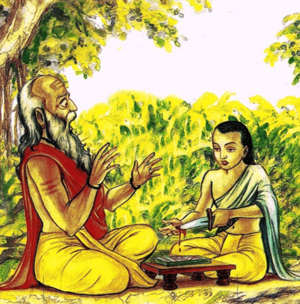Talk:How Pāṇini Became a Great Scholar
By Vishal Agarwal
Once, Pāṇini Muni, the celebrated grammarian of Saṃskṛta (Sanskrit), went to a palmist to have his future read. The palmist examined his hand and said, “You are destined to remain illiterate, for the line of learning is missing from your palm.”
Pāṇini calmly asked, “Please show me where that line should be.” When the palmist pointed it out, Pāṇini took a knife and carved the missing line himself. Determined to overcome his fate, he resolved to abandon laziness and dedicate himself to mastering Saṃskṛta grammar.
After years of intense study and reflection, Pāṇini composed the Aṣṭādhyāyī, one of the most profound and systematic works on grammar ever written. Composed over 2,500 years ago, it remains the foundational text of Saṃskṛta linguistics even today.
The Aṣṭādhyāyī consists of roughly 4,000 concise rules, known as sūtras, which can be easily memorized. The work is divided into eight chapters—two devoted to the grammar of the Vedic language, and six to the grammar of spoken Saṃskṛta and other Śāstric forms. The treatise also includes six appendices, some of which may have been added by later scholars. Pāṇini’s system is widely regarded as the most scientific and logically organized grammatical framework among all world languages.
A popular story recounts that one day, while teaching his students in an open courtyard, a lion appeared and began to roar. While the students fled in fear, Pāṇini remained calm, saying, “The lion’s roar is fascinating—let us analyze its sound according to the rules of Saṃskṛta phonetics.” The lion, however, was uninterested in grammar and killed him.
Centuries later, Pāṇini’s fame endured. Around the 7th century CE, the Chinese traveler Hiuen Tsang (Xuanzang) visited Sālātura, Pāṇini’s birthplace, and recorded seeing a memorial erected in his honor.
Pāṇini’s life illustrates the power of determination and perseverance. Even when told that success was impossible, he transformed his destiny through effort and intellect. His example teaches that with discipline and hard work, every individual can rise above limitation and attain true wisdom.

